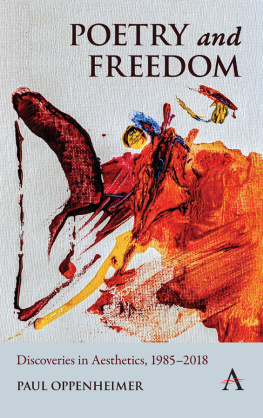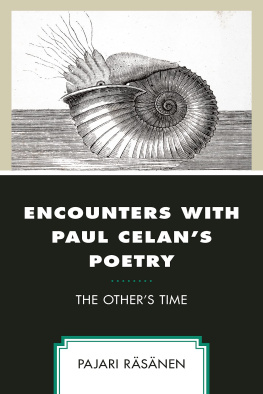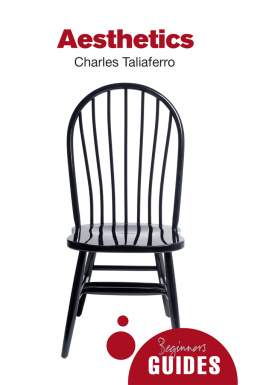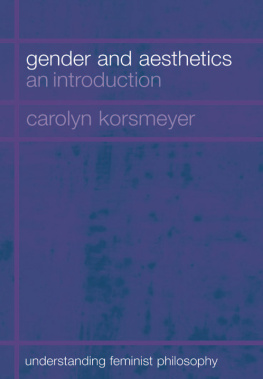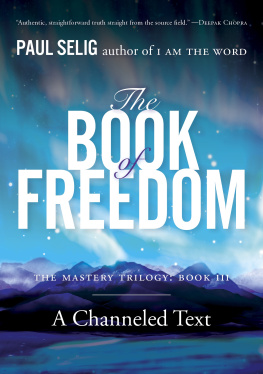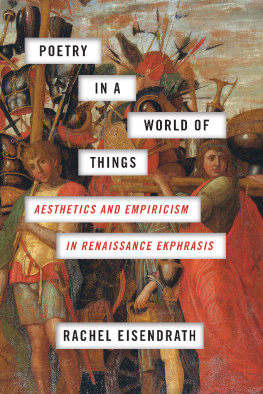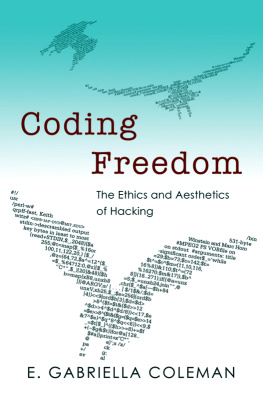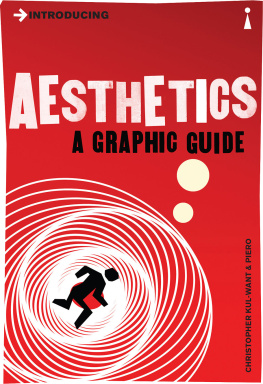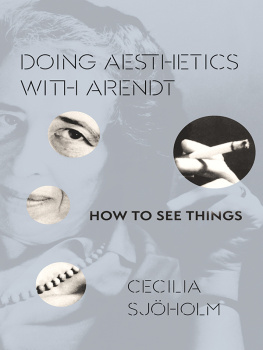Paul Oppenheimer - Poetry and Freedom: Discoveries in Aesthetics, 19852018
Here you can read online Paul Oppenheimer - Poetry and Freedom: Discoveries in Aesthetics, 19852018 full text of the book (entire story) in english for free. Download pdf and epub, get meaning, cover and reviews about this ebook. publisher: Book Network Intl Limited trading as NBN International (NBNi), genre: Romance novel. Description of the work, (preface) as well as reviews are available. Best literature library LitArk.com created for fans of good reading and offers a wide selection of genres:
Romance novel
Science fiction
Adventure
Detective
Science
History
Home and family
Prose
Art
Politics
Computer
Non-fiction
Religion
Business
Children
Humor
Choose a favorite category and find really read worthwhile books. Enjoy immersion in the world of imagination, feel the emotions of the characters or learn something new for yourself, make an fascinating discovery.
- Book:Poetry and Freedom: Discoveries in Aesthetics, 19852018
- Author:
- Publisher:Book Network Intl Limited trading as NBN International (NBNi)
- Genre:
- Rating:5 / 5
- Favourites:Add to favourites
- Your mark:
- 100
- 1
- 2
- 3
- 4
- 5
Poetry and Freedom: Discoveries in Aesthetics, 19852018: summary, description and annotation
We offer to read an annotation, description, summary or preface (depends on what the author of the book "Poetry and Freedom: Discoveries in Aesthetics, 19852018" wrote himself). If you haven't found the necessary information about the book — write in the comments, we will try to find it.
Poetry and Freedom: Discoveries in Aesthetics, 19852018 — read online for free the complete book (whole text) full work
Below is the text of the book, divided by pages. System saving the place of the last page read, allows you to conveniently read the book "Poetry and Freedom: Discoveries in Aesthetics, 19852018" online for free, without having to search again every time where you left off. Put a bookmark, and you can go to the page where you finished reading at any time.
Font size:
Interval:
Bookmark:

Poetry and Freedom
Poetry and Freedom
Discoveries in Aesthetics, 19852018
Paul Oppenheimer

Other books by Paul Oppenheimer
Before a Battle and Other Poems
Till Eulenspiegel: His Adventures (translation)
Beyond the Furies: new poems
The Birth of the Modern Mind: Self, Consciousness and the
Invention of the Sonnet
Evil and the Demonic: A New Theory of Monstrous Behavior
Infinite Desire: A Guide to Modern Guilt
Rubens: A Portrait (biography)
Blood Memoir, or The First Three Days of Creation (fiction)
The Flame Charts: new poems
In Times of Danger (poems)
Machiavelli: A Life Beyond Ideology (biography)
Anthem Press
An imprint of Wimbledon Publishing Company
www.anthempress.com
This edition first published in UK and USA 2020
by ANTHEM PRESS
7576 Blackfriars Road, London SE1 8HA, UK
or PO Box 9779, London SW19 7ZG, UK
and
244 Madison Ave #116, New York, NY 10016, USA
Copyright Paul Oppenheimer 2020
The author asserts the moral right to be identified as the author of this work.
All rights reserved. Without limiting the rights under copyright reserved above,
no part of this publication may be reproduced, stored or introduced into
a retrieval system, or transmitted, in any form or by any means
(electronic, mechanical, photocopying, recording or otherwise),
without the prior written permission of both the copyright
owner and the above publisher of this book.
British Library Cataloguing-in-Publication Data
A catalogue record for this book is available from the British Library.
ISBN-13: 978-1-78527-297-4 (Hbk)
ISBN-10: 1-78527-297-7 (Hbk)
This title is also available as an ebook.
Contents
Not everything here deals with poetry. It all deals with freedom and aesthetics, though, and indirectly at least, with aesthetic innovations in poetry for the sake of freedom.
The type of freedom varies: aesthetic, imaginative, political, individual (which despite popular beliefs in some quarters is not the same as political), sexual, emotional, historical, psychological, linguistic (with respect to translation), rhetorical, fantastical (as in fantasy worlds) and philosophical. A number of puzzling attitudes toward freedom, such as those of the Language poets, to wit, that if poets free their words of all familiar contexts they will produce more adventurous poems, are omitted except to take note of their absurdity. Along these lines, it should be noted that ours may be the first age in which nonsense verse is often produced by people without any sense of humor. In this topsy-turvy situation, in which solemnity is confused with profundity, poets may find it close to impossible to write another Jabberwocky.
From the moment when I began writing these essays and reviews, in other words, I wanted to take a stab at exploring significant aspects of the problem of modern poetic freedom. I also welcomed the fact that in any of the arts the present evokes the past, if only because works of art, at least at first, assume much of their meaning in relation to other works of art. The prospect of dealing with the past in terms of the present retains a magnetic, rather than an antiquarian, appeal: one reads the medieval German poet Walter von der Vogelweide not because he is old but because he is new, and not because he offers more astute insights into his own culture than his historian contemporaries but because his poetic intelligence differs from theirs in refreshing and insightful ways, and not because he is an anthropologist (which he is not) but for his literary style. This literary achievement, that of style, is often neglected now, along with how thrilling and incisive it can be, how valuable, and these essays seek to draw attention to it.
A plan has thus been in place from the start, and it may to some extent excuse collecting and arranging what might otherwise seem unrelated pieces rescued from journals, newspapers and magazines. On the other hand, the plan was always tentative, an effort at reports from the front lines of the struggle for poetic freedom, rather than an attempt to promote some bland ideology. It has always seemed to me that while any responsible critic ought to subscribe to aesthetic and human values, the chance to exercise critical freedom, to observe, test various hypotheses and demur, vanishes amid tedious ideology-promotion schemes.
Why opt for poetic freedom at all, though, rather than some other basis for this book? An apposite answer to this question lies in stressing the importance of what may be called wriggle-room, by which I mean that any unknown artist, and it is worth remembering that even Shakespeare was once unknown, seeks out opportunities to be heard among the rest, if not long after many of them, a free-feeling and free-seeming place in which to be understood on his or her own terms. On occasion, as with T. S. Eliot, the wriggle-room may amount to more than any idea of mere wriggling suggestsit may be more expansivebecause it has been secured through a poetic revolution, though as is suggested below in an essay on Eliots centenary, what constitutes a revolution in the arts is often problematic. Often too, as is argued in Scaling the Wall, a piece dealing with freedom of expression in the defunct Soviet Union (but which I hope readers may find of interest on historical-political grounds), genuine aesthetic revolutions are more apt to be crushed by state bureaucracies less eager to grant wriggle-room to poets than an unpleasant roominess to censors and even, on occasion, executioners.
If authentic wriggle-room, or space for maneuver, is paradoxically crucial to pressurizing, or boiling pure, the quality of good poetry, to refining and strengthening it, the atmosphere surrounding its expression is always unique. The witty breeze wafting through Heines lyrics differs in its smoothness from the wily storms racing through Byrons. Rilkes angelic skies hardly blend with Goethes pagan sun. As a result, the critic needs to be at least an amateur meteorologist of diction. He or she should not only bring back frontline reports on how poetry is meeting new challenges by changing but also weather reports on the cultural atmosphere surrounding the words themselves, and between the words and the world. Venturing into this slip-sliding terrain, which has turned into a modern Hades of angst over belief, and even a lovers angst of mistrust as well as a twilight zone full of the wandering lovers of nightmares, and doing so with fairness, is, I am convinced, the modern critics chief challenge. It emerges here, I hope, in useful ways in the 10 essays and longer review articles that lead off this collection, and with equal if punchier cogency in the shorter articles (and even in my translation of Rilkes Orpheus. Eurydike. Hermes.) that follow, in which a candid critical ambitiousness seeks out fresh perspectives on old questions: even vampirism, as in the penultimate article here, Vampires and Freedom, may have a lot to suggest, and especially these days, about the nature of human and literary freedom of expression.
On the other hand, a drastically different report from the aesthetic front is attempted in the very last essay, on the invention of the sonnet, a broad, research-based inquiry into literary fashions and how people in the West have come to read and write as they do. The issue here is the extraordinary development of silent reading and its effects in modern times.
Font size:
Interval:
Bookmark:
Similar books «Poetry and Freedom: Discoveries in Aesthetics, 19852018»
Look at similar books to Poetry and Freedom: Discoveries in Aesthetics, 19852018. We have selected literature similar in name and meaning in the hope of providing readers with more options to find new, interesting, not yet read works.
Discussion, reviews of the book Poetry and Freedom: Discoveries in Aesthetics, 19852018 and just readers' own opinions. Leave your comments, write what you think about the work, its meaning or the main characters. Specify what exactly you liked and what you didn't like, and why you think so.

